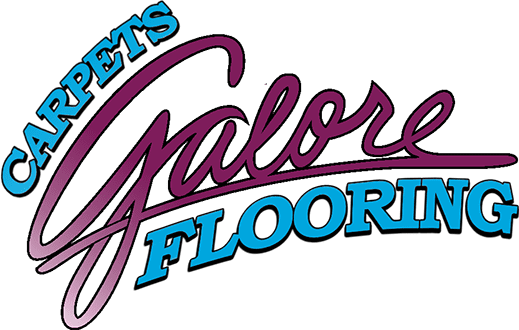Are you confused about all the options for waterproof flooring?
Let’s begin with why you should consider waterproof or water resistant flooring.
Whether it’s a spilled drink, a leaky pipe, or the high humidity of a bathroom, the right waterproof flooring can save you from costly repairs and endless headaches.
Thanks to advances in technology, there are now many beautiful waterproof flooring options available.
Discover how choosing the best waterproof flooring for your home can not only protect your space but also elevate its style and functionality.
In this guide, we’ll explore the top waterproof flooring options, their advantages, and how to select the best fit for your home.
We’ll cover everything from vinyl planks (LVP and LVT) to tile flooring and other solutions, helping you make an informed decision.
Why Waterproof Flooring Is Essential
Waterproof flooring is particularly beneficial in areas prone to moisture and spills, such as bathrooms, kitchens, laundry rooms, and basements.
Over time, excessive moisture can damage traditional flooring types like hardwood or carpet, leading to warping, mildew, or mold. This is where water-resistant flooring shines.
Investing in waterproof flooring not only prevents these issues but also improves the overall aesthetics of your space.
With a variety of stylish, functional, and durable options available, you can enjoy a beautiful floor that withstands the demands of everyday life.
Let’s dive in and explore the other top considerations that keep your floors looking beautiful, no matter what life throws at them.
What is the Most Important Factor To Consider?
When it comes to selecting flooring for your home, one of the most important factors to consider is durability.
Whether you’re renovating a bathroom, upgrading your kitchen, or tackling high-traffic areas, choosing the best waterproof flooring for the space can make all the difference.
Water-resistant flooring options not only protect your investment but also offer peace of mind, knowing that spills, leaks, and humidity won’t damage your floors over time.
What is the Second Most Important Factor To Consider?
Proper installation is the key to ensuring that your waterproof flooring performs at its best over time.
Even the highest-quality flooring can fail if not installed correctly, leaving you vulnerable to water damage, warping, and other issues.
Whether you choose vinyl planks, tile flooring, or another waterproof option, taking the time to ensure a precise installation process is crucial.
This means properly preparing the subfloor, ensuring the correct spacing for expansion, and using the right adhesives or underlayments.
A professional installation not only guarantees a seamless and durable finish but also ensures that your flooring maintains its water resistance and is protected long term.
What is The Difference Between Waterproof and Water Resistant Flooring?
The main difference between waterproof and water-resistant flooring lies in how they handle moisture.
- Waterproof flooring is designed to completely prevent water from penetrating the surface. No matter how much water is spilled or how long it’s left on the floor, it won’t damage the material underneath. This makes it ideal for high-moisture areas like bathrooms, kitchens, and basements.
- Water-resistant flooring, on the other hand, can withstand some exposure to water but isn't immune to damage over time. It's better suited for areas with occasional moisture, like living rooms or hallways, rather than places prone to constant exposure to water.
In short, waterproof flooring offers stronger protection against moisture compared to water-resistant flooring, making it a better choice for high-risk areas.
The Benefits of Waterproof Flooring
- Durability and Longevity: Waterproof floors are designed to stand up to spills and moisture, making them more resilient than traditional flooring options.
- Low Maintenance: Unlike wood floors that need regular sealing or carpeting that traps dirt, waterproof floors are easy to clean and maintain. A simple mop and vacuum will suffice, even in high-moisture areas.
- Versatility: With options like vinyl planks (LVP and LVT), tile flooring, and more, waterproof flooring can complement various home aesthetics, from modern to rustic.
- Comfort: Some waterproof flooring options, like vinyl planks, offer a cushioned feel underfoot, making them ideal for areas where you’ll be standing for extended periods.
- Increase Home Value: Installing waterproof flooring can increase the value of your home, making it a smart investment for homeowners looking to sell.
Top Waterproof Flooring Options
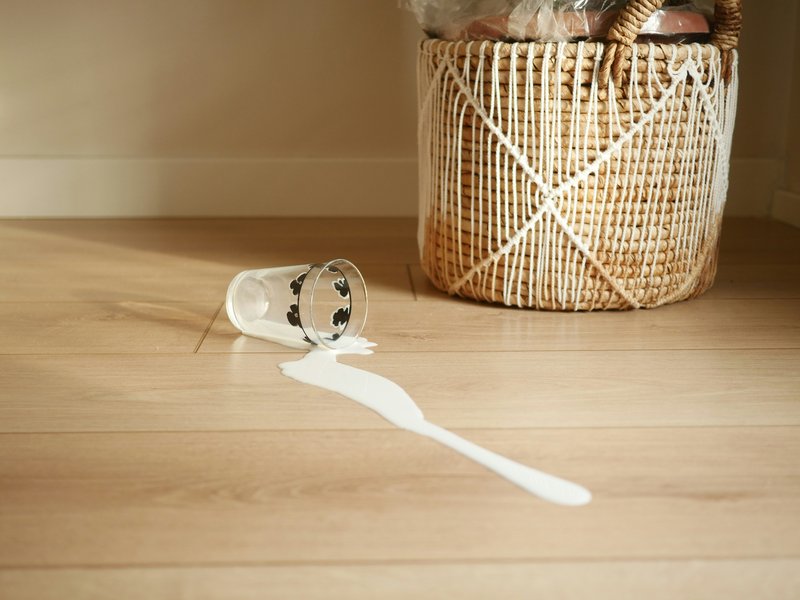
1. Vinyl Planks (LVP and LVT)
Vinyl planks are one of the most popular waterproof flooring solutions, thanks to their affordability, durability, and variety of designs.
Available in both Luxury Vinyl Planks (LVP) and Luxury Vinyl Tile (LVT) formats, vinyl is a versatile option that mimics the appearance of wood, stone, or tile without the high cost and maintenance.
Why Choose Vinyl Planks?
- Waterproof and Scratch-Resistant: LVP and LVT are highly resistant to moisture and can withstand spills, humidity, and even full submersion without warping.
- Easy Installation: Many vinyl planks feature click-lock installation systems, making them a relatively faster choice.
- Stylish Designs: With a vast selection of colors, textures, and finishes, vinyl can easily complement any décor.
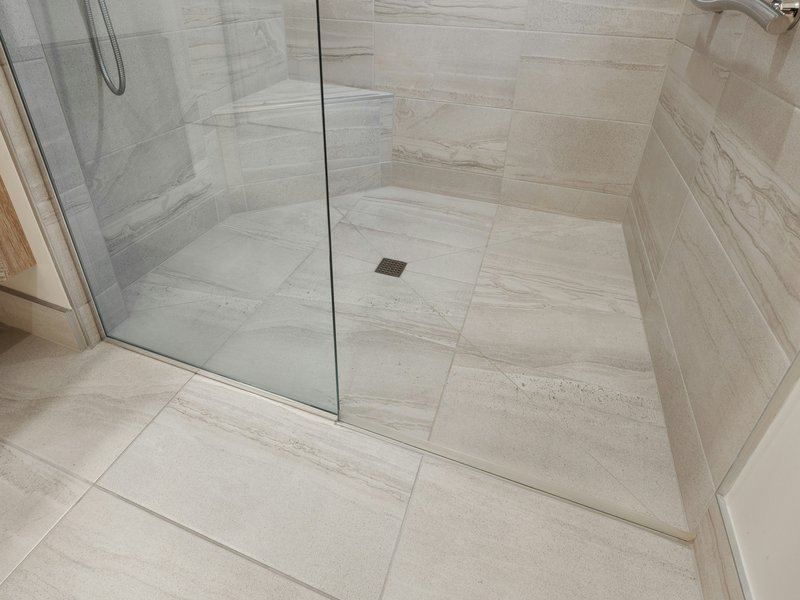
2. Tile Flooring
Tile flooring has been a go-to option for bathrooms, kitchens, and other moisture-prone areas for centuries.
With advancements in modern tile manufacturing, today’s tile flooring options are more durable and stylish than ever.
Why Choose Tile Flooring?
- Waterproof and Long-Lasting: Ceramic, porcelain, and stone tiles are naturally resistant to moisture, making them an excellent choice for areas that experience heavy water exposure.
- Variety of Styles: Tiles come in an endless range of colors, shapes, and finishes, allowing you to create a custom look for any room.
- Easy to Clean: Tile’s smooth surface makes it easy to wipe away spills and stains.
While tile is highly waterproof, keep in mind that the grout lines may require regular cleaning to prevent moisture buildup.
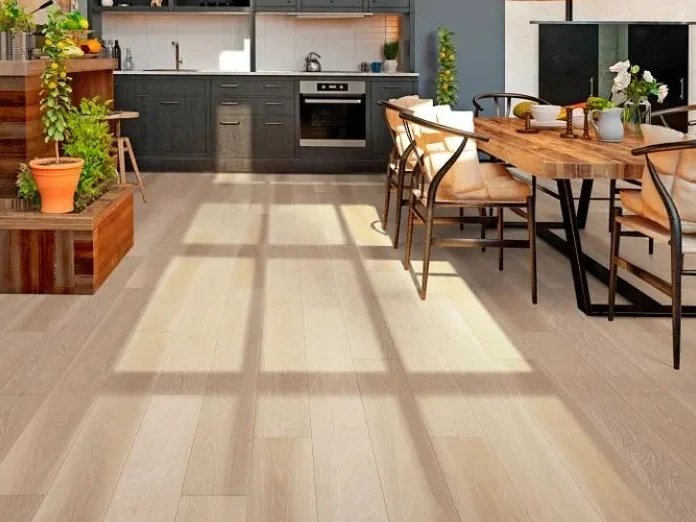
3. Waterproof Laminate Flooring
Waterproof laminate flooring offers the classic appearance of wood floors with added moisture protection.
Unlike traditional laminate, which can warp and bubble when exposed to moisture, water-resistant laminate is treated with a special coating to prevent water from seeping in.
Why Choose Waterproof Laminate?
- Affordable: Waterproof laminate is often more budget-friendly than other waterproof options like tile or hardwood.
- Wood-Like Aesthetic: With improved technology, laminate can mimic the look of real wood, making it a great choice for those who love the appearance of hardwood but need extra durability.
- Resistant to Scratching and Fading: Waterproof laminate can stand up to the wear and tear of daily life.
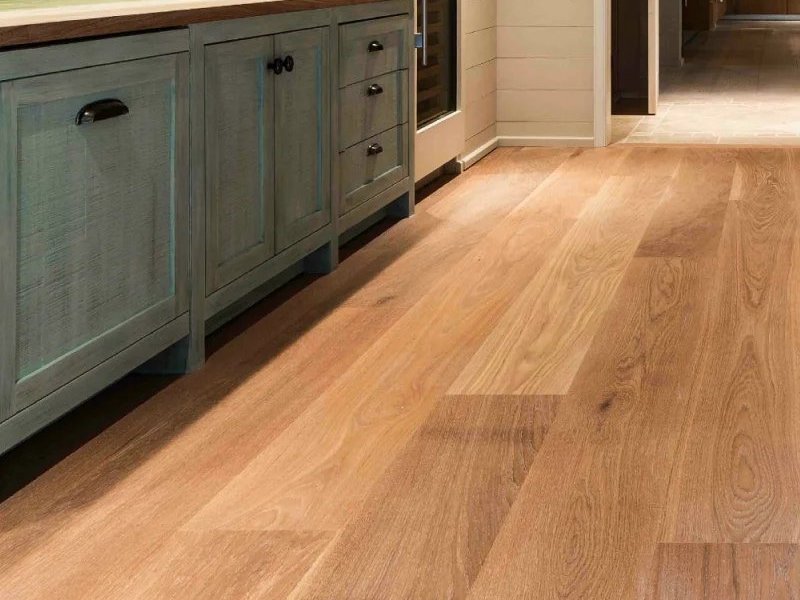
4. Engineered Wood Flooring
While solid hardwood isn’t ideal for areas exposed to high humidity, engineered wood flooring offers a waterproof solution with the look and feel of traditional wood.
The key difference is that engineered wood is constructed with multiple layers, making it more stable and less prone to warping.
Why Choose Engineered Wood?
- Water-Resistant: Engineered wood is more resistant to moisture than solid hardwood, though it’s not completely waterproof.
- Sleek and Elegant: Engineered wood provides a timeless, high-end look that works well in living rooms, kitchens, and dining rooms.
- Eco-Friendly: Since engineered wood uses fewer natural resources than traditional hardwood, it can be a more sustainable flooring option.
Let’s Explore The Impact Of Waterproof Flooring
Choosing the best waterproof flooring requires careful consideration of your needs, style preferences, and budget.
Here are some tips to help you make an informed decision:
1. Consider the Room’s Purpose
Different rooms in your home may require different types of flooring. For instance:
- Bathrooms and kitchens will benefit from tile flooring or vinyl planks.
- Living rooms and bedrooms may be better suited for water-resistant laminate or engineered wood.
2. Think About Style and Aesthetic
Whether you prefer the look of natural wood, stone, or sleek tiles, there are plenty of waterproof flooring options that suit various styles.
If you want the authentic look of hardwood, LVP and LVT offer a wide range of designs. For a more polished and refined look, tile flooring can add an elegant touch to your space.
3. Evaluate Durability and Maintenance
While most waterproof floors are easy to clean, some require more maintenance than others. For example, tile flooring may need grout cleaning, while vinyl planks are typically low-maintenance.
4. Budget Considerations
Waterproof flooring can range from budget-friendly vinyl planks to more expensive tile or engineered wood options. Always balance your aesthetic desires with your budget.
5. Installation Needs
If you’re looking for an easy DIY project, vinyl planks and waterproof laminate offer straightforward installation options. For more complex installations, tile flooring may require professional help.
6. Environmental Conditions
In a climate like Las Vegas, where temperatures can soar above 100°F in the summer and humidity levels fluctuate, the right waterproof flooring can make all the difference in maintaining both durability and aesthetic appeal.
The extreme heat and dryness can cause some flooring types to warp or crack over time.
Choosing the right waterproof flooring ensures that your home remains protected against the challenges of the desert climate while preserving the beauty of your space year-round.
FAQs About Waterproof Flooring
The best mop for waterproof flooring is typically one with a microfiber head that can effectively clean without leaving excess water on the floor. Avoid using a steam mop, as it can damage certain waterproof finishes.
Yes, many waterproof flooring options, like vinyl planks, can be installed over existing floors. However, it’s important to ensure the surface is clean, dry, and level for optimal results.
The lifespan of waterproof flooring depends on the material. Vinyl planks can last 10-20 years, while tile flooring can last a lifetime with proper care.
Conclusion
Choosing the best waterproof flooring is an investment that will pay off in the long run by keeping your floors protected from moisture damage while adding style and comfort to your home.
Whether you opt for vinyl planks, tile flooring, or another durable option, make sure to consider your specific needs, aesthetic preferences, and budget.
With the right flooring choice, you can create a beautiful, functional space that stands the test of time.
By understanding the benefits and features of various waterproof flooring options, you’re one step closer to finding the perfect solution for your home. Happy flooring!
Let Us Help You Get Started!
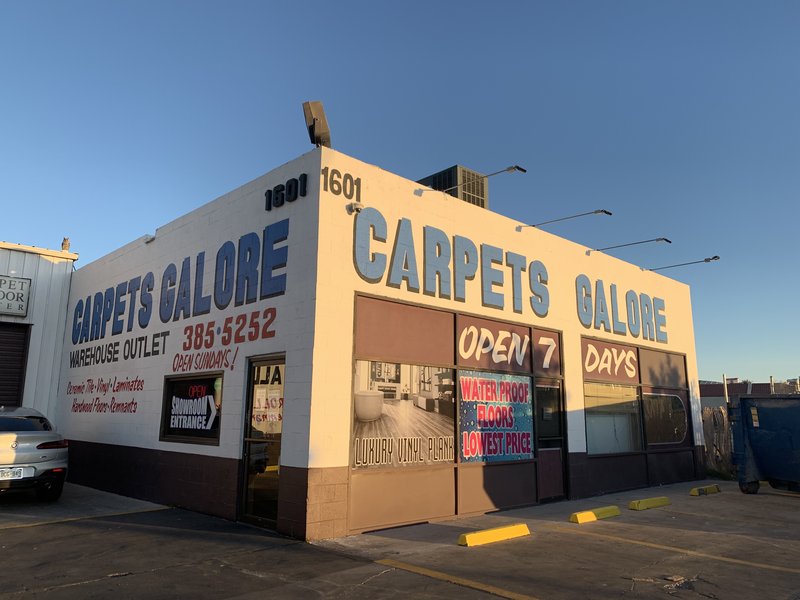
At Carpets Galore, we specialize in helping you find the perfect flooring solution tailored to your needs.
Whether you’re renovating a bathroom, upgrading your kitchen, or looking for a durable, beautiful option for any room, our team is here to guide you every step of the way.
With a wide selection of high-quality waterproof flooring options and expert installation services, we ensure that your floors stay safe, stylish, and long-lasting.
Contact us today to schedule a consultation and let us help you create the perfect space with the best waterproof flooring for your home. We look forward to helping you bring your flooring dreams to life!
